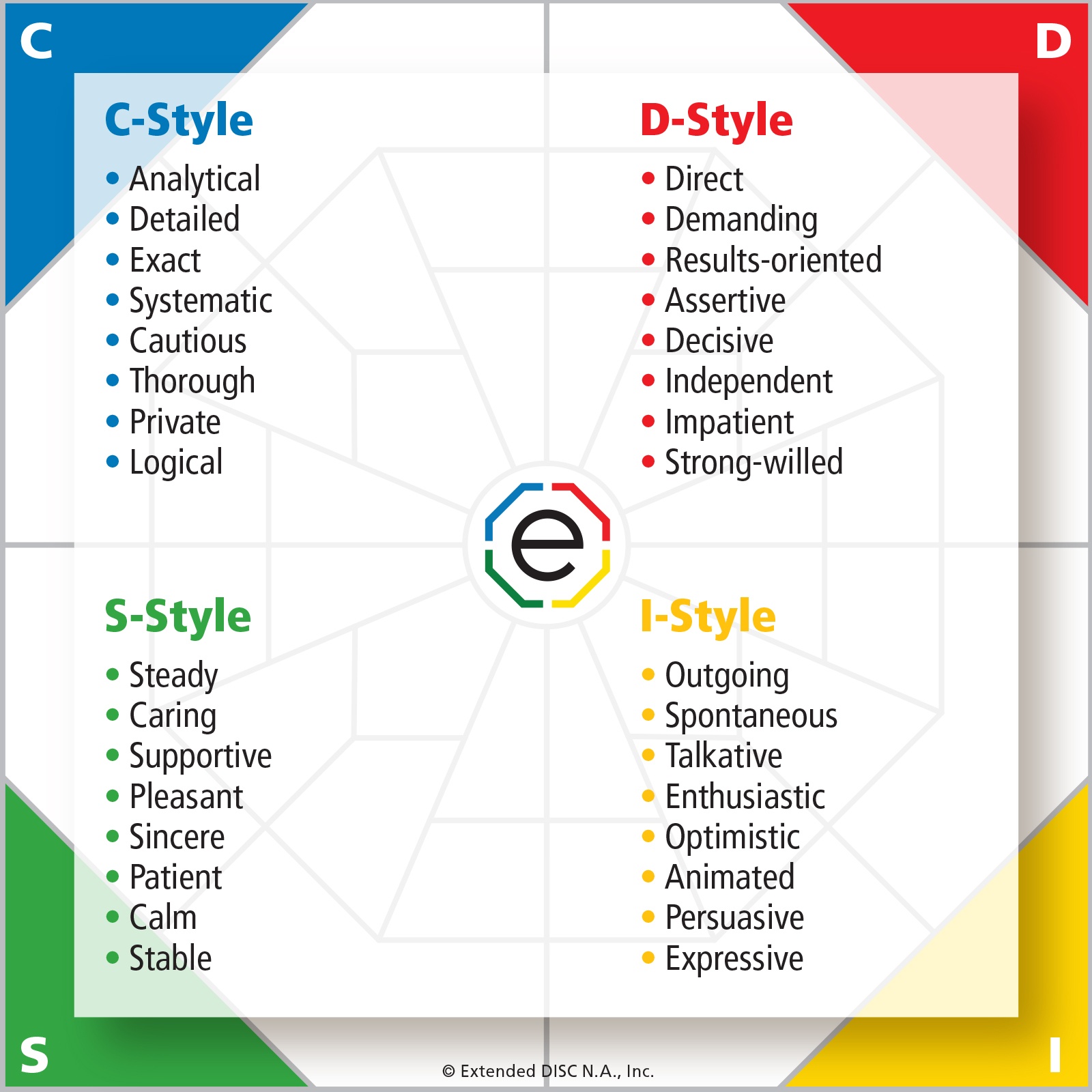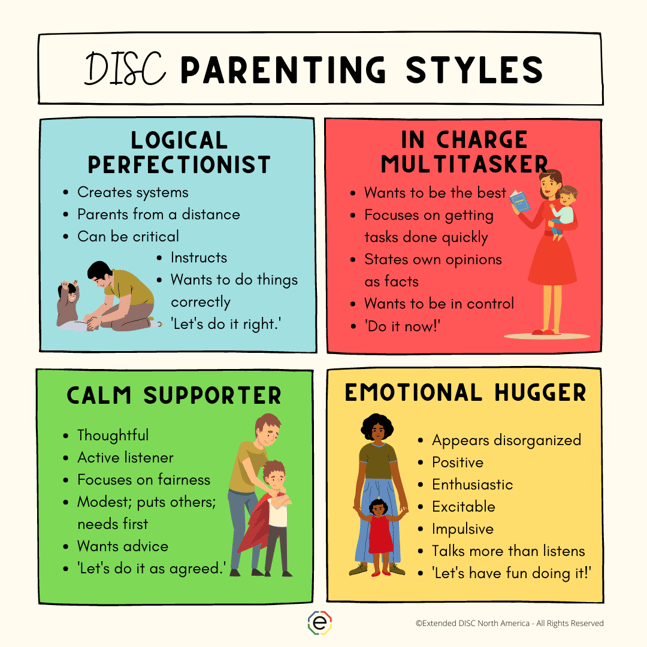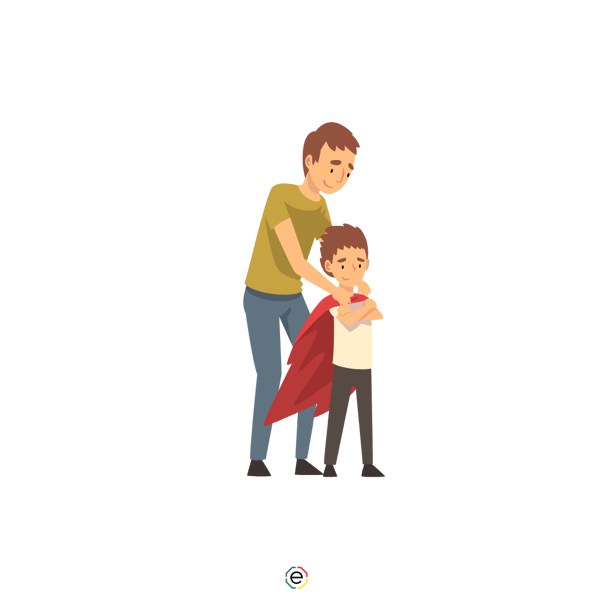Raising kids is not easy; that's the truth! So, we could all use a little help.
You feed and shelter your kids. You protect and nurture them. Soon enough, they're off to places you can't always be. Sorry to tell you, it will come earlier than you think; it always does.
The DISC tool
 DISC is by no means an expert's guide to parenting, nor does it decide if you're parenting well or not. It describes the DISC behavioral styles, not as good or bad; just different. Additionally, it identifies your most comfortable behaviors so you can act on the feedback.
DISC is by no means an expert's guide to parenting, nor does it decide if you're parenting well or not. It describes the DISC behavioral styles, not as good or bad; just different. Additionally, it identifies your most comfortable behaviors so you can act on the feedback.
When it comes to parenting, it's about trial and error, practice, and simply doing your best. DISC supports you by helping you understand how you prefer to parent; even under stress or strong emotions.
DISC helps you maximize your behavioral strengths and be more aware of behaviors that challenge you. In addition, DISC helps you better understand your kids' and partner's behavioral styles so you can make more effective adjustments along the way.
DISC also shows how you to tend to come across to your children and your partner. It provides information and feedback to help you better manage your behaviors in different situations and for the most important people in your life.
Parenting and DISC
 Your style doesn't hold you back from being the best parent you can be. It helps you know your comfort zone and when to put in more effort to stretch beyond it. DISC does not measure all aspects of who you are. For instance, your attitude (make it a good one!), your parenting experience and skills, and intelligence all enhance how you parent and are not measured by DISC.
Your style doesn't hold you back from being the best parent you can be. It helps you know your comfort zone and when to put in more effort to stretch beyond it. DISC does not measure all aspects of who you are. For instance, your attitude (make it a good one!), your parenting experience and skills, and intelligence all enhance how you parent and are not measured by DISC.
Often times, there is more than one person in the parenting equation: presenting communication challenges. DISC helps explain those differences in parenting styles. DISC provides non-judgmental feedback; no style is better or worse, they are simply different. As parenting partners, you have talking points to proactively discuss your similarities and differences, better manage conflict, and parent more effectively.
The most powerful outcome is understanding how you prefer to parent, but also, having the situational awareness of when to adjust your style. Success comes from owning your behavioral strengths and challenges and making the most effective adjustments needed.
Now, let's look at your parenting style.
Are you the In-Charge Multi-tasker?
 Is your common refrain, 'Hurry up! Get it done now! Because I said so!'? Are you someone who tends to focus on getting tasks done quickly based on your direction? Do you tend to emphasize the accomplishments and less on feelings?
Is your common refrain, 'Hurry up! Get it done now! Because I said so!'? Are you someone who tends to focus on getting tasks done quickly based on your direction? Do you tend to emphasize the accomplishments and less on feelings?
Your natural inclination is to be in control. Competitiveness spurs you to challenge your child and yourself to be the best. You tend not to like your authority challenged because yours is the final word.
If these descriptions sound like you then you are likely a D-style parent.
Remind yourself that parenting and strong emotions go hand in hand. Strong emotions divert our ability to adjust, and we start to overuse our style. Under pressure you may come across as an authoritarian, brusk, and insensitive. Push yourself outside your comfort zone by slowing it down, asking for input, and focusing more on feelings.
Are you the Emotional Hugger?
 Are you the fun and energetic parent? Do you like to 'talk it out' and focus on emotions? Do you thrive in social chaos? Can you lose track of time and details? Do you prefer to avoid the negative aspects of things? Do your kids tell you, 'too much hugging!' or 'give me some space!'?
Are you the fun and energetic parent? Do you like to 'talk it out' and focus on emotions? Do you thrive in social chaos? Can you lose track of time and details? Do you prefer to avoid the negative aspects of things? Do your kids tell you, 'too much hugging!' or 'give me some space!'?
If these descriptions sound like you then you are likely an I-style parent.
When you're under pressure or feeling strong emotions, you may become an overly emotional defender on issues. Rejection and negative comments, and there will be many from your kids, can hit you hard. You want to be the "nice" parent so establishing boundaries and saying "no" can be challenging. Push yourself outside your comfort zone by better managing your emotions, getting yourself organized on your tasks, and knowing tough decisions are another part of your job.
Are you the Calm Supporter?
 Are you the patient and nurturing parent; always striving for calm and stability for all? Do you prioritize your family members first and foremost, often at the expense of your own needs? Do you defend your family stubbornly and loyally? Are your routines and plans important to you? Do you tend to worry about what you're not doing well versus focusing on what you are? Accountability, doing what you say you're going to do, may feel like a promise to you, but it may not be the same for your kids and others.
Are you the patient and nurturing parent; always striving for calm and stability for all? Do you prioritize your family members first and foremost, often at the expense of your own needs? Do you defend your family stubbornly and loyally? Are your routines and plans important to you? Do you tend to worry about what you're not doing well versus focusing on what you are? Accountability, doing what you say you're going to do, may feel like a promise to you, but it may not be the same for your kids and others.
If these descriptions sound like you then you are likely an S-style parent.
Under pressure, the strong emotions you're feeling are not always obvious to your kids. Practice expressing yourself! One thing all parents agree on is that kids are unpredictable and that's a challenge for your style. Breathe, practice accepting the chaos that is part of parenting. Sometimes, that chaos leads you and your kids to amazing places. Focus on positive encouragement. Most importantly, take care of yourself so you can take care of your kids.
Are you the Logical Perfectionist?

Are you the more reserved, logical parent? You don't rush to make decisions; preferring to take in all the details and information. Do you like your systems and routines? Surprises are not comfortable. Are you one who doesn't challenge or like to get into conflict? Have you exhaustively researched the best strollers, car seats, and cribs; maybe even set up a spreadsheet to track them?
If these descriptions sound like you then you are likely a C-style parent.
Under pressure, you may become rigid and focused on doing thing the correct way. It may come across as nit-picky and overly critical. Remind yourself that mistakes can be learning experiences. Remember, you tend to be more economical in your feedback, but your kids may want more effusive feedback. For example, try saying 'that was amazingly awesome' versus "good job'. Take a step back from the daily routines and tasks to remind yourself you are in this for the long haul and raising complex, and beautiful little humans!
Don't skip this!
 You are not defined by your style alone. You have the ability to be and do anything you want to do; DISC just helps you understand which behaviors tend to be natural and which ones you need to use energy and push yourself outside your comfort zone. It strengthens your situational awareness and helps you make better decisions on how to communicate and interact with your kids.
You are not defined by your style alone. You have the ability to be and do anything you want to do; DISC just helps you understand which behaviors tend to be natural and which ones you need to use energy and push yourself outside your comfort zone. It strengthens your situational awareness and helps you make better decisions on how to communicate and interact with your kids.
Don't box your kids in! While they're still developing and growing into their natural stye, be aware that they too have behavioral preferences. Try to identify what motivates and demotivates them. Help them build confidence by relying on their strengths and helping them develop their areas of development. Remember, your kids, like you, are complex human beings. They may not have fully shaped their hard-wired behavioral style so give them room to grow.
There is no one way to parent. You work at being the best parent you can be and by reading this blog, you are continually trying.
At the end of every day, great questions to ask yourself are, 'How did I do my best today?' and 'What could I adjust to better the interact with my kids tomorrow?'
You've got this!

